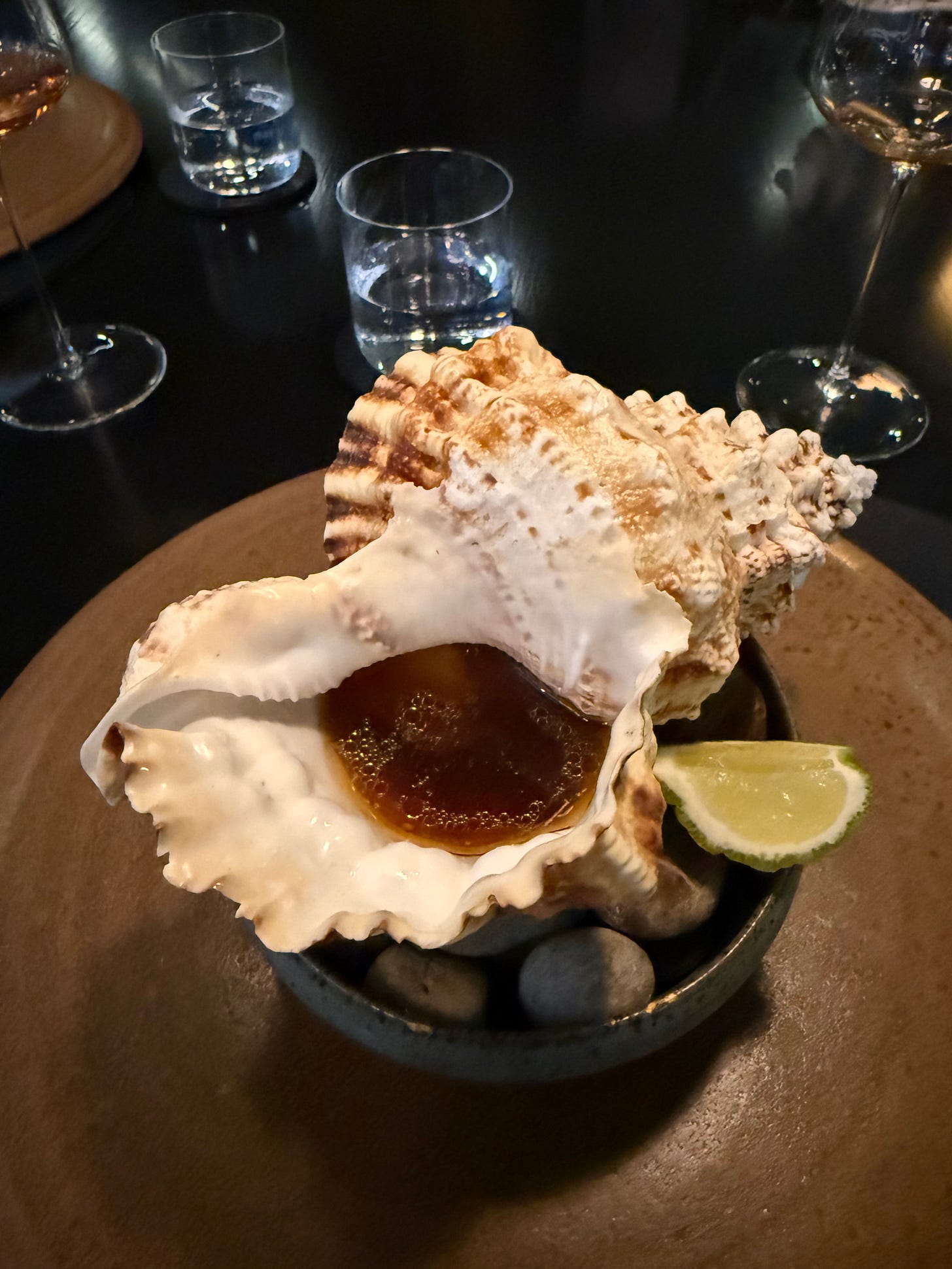Worries, Discoveries and Lessons From Mounjaro
Re-thinking the dualism and other Lessons Mounjaro Taught Me
I admit that I was rather skeptical about weight loss drugs; however, I have changed my mind. First, because the evidence available at this time seems to show these drugs are effective. It has been available for quite some time — as my care team explained. Second, using these substances has been transformational. This experience has been more thought-provoking than I had foreseen and I find myself considering questions of autonomy, free will, and my ability to learn about the world.
Overall, I am pleased.
Today, I would like (if you indulge me) to share some worries, discoveries, and tribulations of my experience using GLP- (Mounjaro/Zepbound). I have no conflicts here, and I am not trying to encourage readers to try or use GLP-1s. Instead, I want to explore my experience.
I was hypertensive for months if not years. By mid-April, about two months after starting Mounjaro my my blood pressure lowered and is now in the optimal range. In April, we decided to lower my dose of losartan (50 to 25), given the positive change in blood pressure. If it continues to go this well, then we can, likely, eliminate this drug. So the combination of this injection with exercise is already making me healthier by decreasing the likelihood of chronic disease as I get older.
Nevertheless, there are reasons that I was hesitant to use Mounjaro. Since starting, I have come to discover some things about myself, and have had to face some facts about myself.
Worry 1: Would Food Become Fuel?
I really worried that my relationship with food would change. When I was a child I was a super picky eater, but I am now the most adventurous eater in my family.
I love to be surprised by food and enjoy tasting menus. Food is not, and should not be gasoline despite the best efforts of a work-obsessed culture. Instead, we should see food for what it is:
Food is an expression of love.
Food is an art form.
Eating is not just about nutrition, but rather a celebration of life, achievement, and culture. The combination of flavors, the history of techniques, the uniqueness of spices, colors, and tastes– there are endless worlds to discover.
Food is to be enjoyed. To be shared.
In many ways food is also history – the history of our species, our planet, and of cultures. I did not want to sever this connection to food.
I still enjoy food because I no longer feel ravenous, I can enjoy it more.
Worry 2: The End of Breaking Bread
Breaking bread is such a lovely experience – eating with someone you fancy, eating with friends, family, students, and even strangers. When I was a teacher, sometimes, my students would invite me to sit with them during school lunch—and it was always a delight. An opportunity to see them in a different context, and to learn about their worlds. I wish more teachers would do this. It would help them connect.
Food can help have a conversation rather than a discussion. It is much harder to step away from a meal than it is to step away from a conversation and it is harder to step away from a conversation than it is from an online interaction. Sharing a meal forces the people involved to share. To share foods, to share words, to share ideas, and more.
Lesson 1: Work, Food, and Choices
I tremendously enjoy reading, writing, and researching. Often I found myself engrossed in my work and only realizing I had not eaten when I was ravenous. In those moments I used to reach for whatever was quicker: chips, pizza, burgers, etc. Given that I was rather hungry, I also ate more than I needed, and with haste.
This is no longer the case – this drug has almost eliminated desperate hunger.
Lesson 2: Snacking as “Medicine”
One of the hardest realizations was that I used food to combat stress and boredom.
After starting with GLP-1 I would head to the fridge and pantry and unlike before nothing jumped out.
I came to see that I was not hungry. That these trips to the kitchen were not really about snacking, but a means to taking a break.
I ate because I was bored, stressed, or looking for a break.
And now? Well, I need to figure this out.
Lesson 3: I am not in control.
The most striking lesson has been that I (the conscious part of me) was not actively controlling my eating habits. Or maybe I was – and now the drug is.
This drug has drastically changed my cravings, and my sense of fullness, and almost entirely eliminated my feeling of hunger. Yet, when I want to, I can enjoy a tasting menu – which let’s face it is a pretty large meal. I fully realize this is in tension with the weight loss goal, but it is all about balance.
I am happy I do not feel stuffed and that I can still enjoy these meals. These are important cultural activities for me. Even if they make the weight loss journey longer.
After being on this medication, I feel more in control of how much I eat, when I eat, and how I eat.
In some ways, GLP-1 has unveiled some unhealthy habits. It has also raised the question of what it means to control one’s relationship with food. I have said that I feel more in control, but if I were not taking this drug, I would clearly be making different decisions.
Thus, has the drug given me back control, or has it taken control? Does it matter?
This is another instance in which I am amazed at how a relatively small substance can affect our perception – we are not only embodied thinkers – but bodies that sense and feel differently when exposed to certain substances. A small pill, a few ml injected, or a substance smoked can drastically alter our perception. This, in some ways, undermines our ability to interact with the world and consequently, our ability to know about the world.
Lesson 4: Cheers! Drinking and GLP-1
Some GLP-1 users claim that the drug has radically changed their drinking habits. There are some indications that it may even help treat individuals with drinking problems. In my anecdotal and subjective experience – it certainly has dampened some of the effects associated with drinking presumably because it slows digestion. I find myself more often than not wanting to drink less than I did before injecting. As with food it has not eliminated my enjoyment of beverages.
I suspect this betrays another kind of dualism, one that sees the mind-body as connected but separated from the outside. A view that recognizes that my mind does not exist without my body, but one that strives to separate the body from the world. This view may be equally untenable. Some thinkers have suggested it is a mistake to separate the mind from the body, and that may not go far enough. The body, it seems, cannot be separated from the space in which it exists.
Lesson 5: Less Neuropathic Pain
As I have discussed earlier I have NF – a genetic disease–which can cause neuropathy. I have been treating neuropathic pain with gabapentin (as advised by my doctors) and while this drug diminished the intensity and frequency of painful episodes it did not eliminate it.
Surprisingly, GLP-1 seems to have significantly helped.
I found some anecdotal accounts of other people whose neuropathy also improved after using GLP-1s. I am not sure why this drug should affect neuropathy, but some speculated that it reduces inflammation and consequently could diminish neuropathy. Could it be a placebo?
As an advocate for decision-making based on science-based evidence, I prefer to use therapies that are supported by evidence and for which there is a plausible explanation as to why they are effective. In contrast, some people advocate for evidence-based medicine which makes decisions solely on data even if there is no plausible mechanism as to why these interventions are effective.
I do not know what has helped my neuropathy – but my experience is less painful. My intellectual side craves data and an explanation. My body reminds me that the absence of these does not mean they will not be discovered – that perhaps what matters is that I experience less pain, rather than why that is the case.
Worry 3: Pleasure, Rewards, and the Unknown
GLP-1-like drugs have been around for quite some time. Thus far the science suggests they are safe. There are a few studies in mice where these drugs were given in extremely high doses and they caused thyroid problems. My endocrinologist assured me that the kinds of receptors in the human thyroid are different than in mice, and thus that these medicines should not have such an effect on humans. Nevertheless, we admittedly do not know what using these drugs for decades could cause.
My biggest worry is that we do not fully understand the mechanism by which these drugs act and how they can affect other parts of an individual's life. GLP-1 medications appear to act on pathways involving reward mechanisms. Messing around with reward centers and systems seems ill-advised. Could this mucking about ruin other healthy reward mechanisms?
Would I also lose interest in other activities? Would this drug dampen my reading, writing, and living? Are these pathways connected biochemically and could interfering with one affect others? Would other activities be affected in the way eating was affected? If we abstract these activities as “A” and we find that these medicines reduce A (overeating, smoking, drinking) can they also impact other activities A* (exercising, reading, writing, thinking, studying, etc). Is the impulse for each of these similar in a biochemical sense and thus possibly at the mercy of GLP-1?
So far I have kept my reading, writing, living, and exercising.
This last one is incredibly important because health outcomes correlate more strongly with body composition than with weight – and when you shed kilos both fat and muscle will go.
I do not know how this story will unfold. I hope these medicines allow me to be in a place in which it is statistically less likely I will develop certain diseases. I hope my neuropathy continues to improve, and that I can do well.
I find myself confused about where my mind-body begins and where it ends. I am less certain about my ability to perceive the world without being under the influence of a context (physical, sociological, physiological, or pharmaceutical) which could drastically alter my thinking.








Good work here, Christian! I admire the way you somehow manage to turn your own experiences into interesting, readable material without becoming self-indulgent. It's a bit of a trick to pull off, but you manage it in a way that many other Substackers might envy. I wish you all the best of luck with this medical journey!